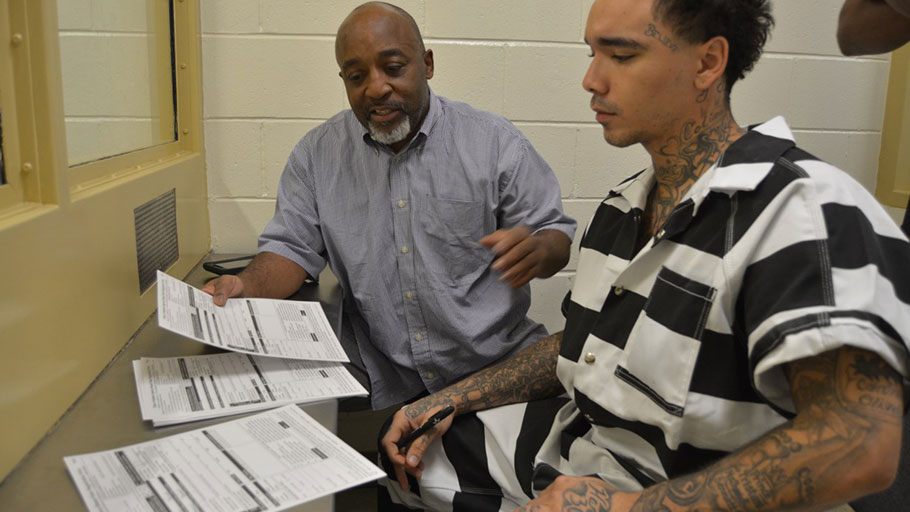Glasgow Helps Collin Bennett Register to Vote Inside the Dothan City Jail. Credit: Kira Lerner
DOTHAN, ALABAMA — “Today is the last day to register to vote in the state of Alabama,” Pastor Kenneth Glasgow said into a microphone, his energy lighting up the radio studio in the office of a community group he runs. “Those of you listening in the prison cells right now: You can vote if you don’t have a murder charge or any kind of sex charge.”
For 90 minutes on Monday morning, Glasgow and his co-host spoke on the air about the importance of registering before the midnight deadline. Through The Ordinary People Society, the non-profit community organization he founded in 1999 after he served more than a decade in prison on drug charges, Glasgow says he has helped hundreds of thousands of people register to vote. In 2008, he won a lawsuit allowing him to register people inside prisons, but most people inside were still disenfranchised — until this year
In May, Gov. Kay Ivey (R) signed into law a bill, the Definition of Moral Turpitude Act, championed by Glasgow and other voting advocates. Under Alabama’s 1901 constitution, anyone convicted of a “crime of moral turpitude” was prohibited from voting, but the state never defined what moral turpitude was. For decades, county registrars would all use different criteria and provide voters with conflicting information. The new law, however, clarifies the crimes that permanently disenfranchise a former felon, opening the doors for tens of thousands of people with drug charges and other lower level felonies to register to vote.
“We’re trying to right a wrong by giving people their rights back, who never should have lost them in the first place,” Glasgow said.
Molly Meadows, the chairman of the Houston County Board of Registrars, said that if Glasgow didn’t visit the Dothan jail, it’s likely the inmates there would not be able to vote.
On Monday, the last day Alabama citizens could register to vote for the December 12 Senate election, Glasgow and his team of volunteers were hard at work to inform the many Alabamians who still don’t know they are eligible to vote. While the Washington, D.C.-based Campaign Legal Center, in a lawsuit against the state filed last year, is seeking an educational campaign that would inform voters of their current rights, the litigation is still ongoing and the state has done little to spread the word.
Danielle Lang, the deputy director of voting rights for the organization, said that while the state won’t provide resources to inform voters, it’s crucial that people like Glasgow fill in.
“The most important thing that anybody can do right now is to use their voice to try to reach as many people as possible,” she said. “The state’s not going to do it between now and December 12th.”
First thing on Monday morning, Glasgow and his colleague Kenneth Robinson recorded their daily radio show, reminding people across Alabama that if they can’t vote, they “can’t complain.” Throughout the day, black residents of Houston County stopped by his office to fill out voter registration forms.
One of those people was 29-year-old Barbara Hughes, who stopped by with her older sister. Hughes said because of her drug conviction, she did not know she could vote until Glasgow informed her she could. She will vote for the first time ever in December.
“It feels good,” she said. “It makes you feel important.”
Helping Hughes register was Anna Reynolds, a 61-year-old volunteer who helps others regain their rights after losing them herself. Reynolds voted for President Obama in 2008 and 2012, but in 2016, she was told that her criminal record prevented her from casting a ballot. This year, Glasgow assured her that the changed law means she will have no problems.
“Even though I was born in this country, I feel more like a citizen,” she said. “It’s like a rebirth.” She said that this year, she looks forward to voting for Democratic candidate Doug Jones.
The irony of the fact that Republican candidate Roy Moore has been accused of sex crimes — one of the few crimes that still disenfranchises Alabama citizens — does not go unnoticed for Glasgow. On his radio program, he spoke at length about the multiple women who have accused Moore of sexual assault. He said formerly incarcerated people “swarming the polls” — like they did in Virginia earlier this month after the governor granted tens of thousands of clemencies — has the potential to swing the seat to Democrats.
“We have the chance to do the same thing they did in Virginia,” he said. “We can turn it blue. Well not blue, but we can add some color. Make it pink or purple.”
On Monday afternoon, Glasgow and two of his volunteers stopped by the Dothan City Jail where he had been told that another inmate, 25-year-old Collin Bennett, wanted to register to vote. On the way, he explained that this particular facility is his “model jail” where he first started registering people locked up in 2003. Today, pastors and other volunteers help Glasgow get into hundreds of jails and prisons across the state.
After sliding a stack of fresh voter registration forms through a slot into the prison, Bennett appears into the visiting room of the jail dressed in a striped jumpsuit and orange rubber shoes. He immediately sits down next to Glasgow and begins filling out the form with the jail address, where he will be on December 12.
“You’re a full citizen,” Glasgow told him, giving him an enthusiastic pat on the back. Bennett smiled, shaking his hand. “That feels good, man.”















